U.S.-CHINA ECONOMIC AND SECURITY REVIEW COMMISSION – FACT SHEET

Establishment: The Commission was created on October 30, 2000 by the Floyd D. Spence National Defense Authorization Act for 2001 § 1238, Pub. L. No. 106-398 (Oct. 30, 2000) (codified at 22 U.S.C.§ 7002 (2001)); as amended by the Treasury and General Government Appropriations Act for 2002 § 645 (regarding employment status of staff) & § 648 (regarding changing annual report due date from March to June), Pub. L. No. 107-67, (Nov. 12, 2001); as amended by Division P of the “Consolidated Appropriations Resolution, 2003,” Pub L. No. 108-7 (Feb. 20, 2003) (regarding Commission name change, terms of Commissioners, and responsibilities of Commission); as amended by the Science, State, Justice, Commerce, and related agencies Appropriations Act of 2006, Pub. L. No. 109-108 (Nov. 22, 2005) (regarding responsibilities of Commission and applicability of FACA); as amended by Pub. L. No. 110-161 (Dec., 26, 2007) (regarding changes in annual report due date, submission of financial reports, printing and binding of Congressional reports, employee compensation and performance reviews, and applicability of House rules for travel by members and staff); as amended by the Carl Levin and Howard P. “Buck” McKeon National Defense Authorization Act for Fiscal Year 2015 § 1259b, Pub. L. No. 113-291 (Dec. 19, 2014) (regarding changes to matters for discussion in annual reports of the Commission).
Purpose: To monitor, investigate, and submit to congress an annual report on the national security implications of the bilateral trade and economic relationship between the United States and the People’s Republic of China, and to provide recommendations, where appropriate, to Congress for legislative and administrative action.
Composition: The Commission is comprised of 12 members, three of whom are selected by each of the Majority and Minority Leaders of the Senate, and the Speaker and the Minority Leader of the House. The Commissioners serve two-year terms.
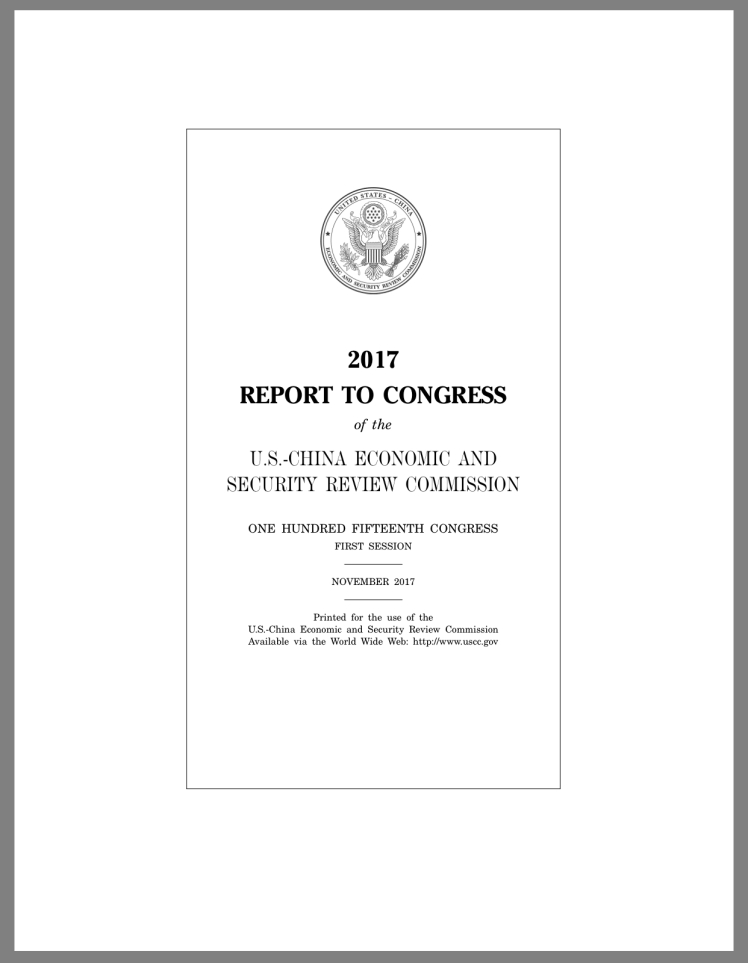
In accordance with our mandate, this Report, which is current as of October 6, includes detailed treatment of our investigations of the areas identified by Congress for our examination and recommenda- tion. These areas are:
• The role of the People’s Republic of China in the proliferation of weapons of mass destruction and other weapon systems (includ- ing systems and technologies of a dual use nature), including actions the United States might take to encourage the People’s Republic of China to cease such practices;
• The qualitative and quantitative nature of the transfer of Unit- ed States production activities to the People’s Republic of China, including the relocation of manufacturing, advanced technology and intellectual property, and research and development facili- ties, the impact of such transfers on the national security of the United States (including the dependence of the national securi- ty industrial base of the United States on imports from China), the economic security of the United States, and employment in the United States, and the adequacy of United States export control laws in relation to the People’s Republic of China;
• The effects of the need for energy and natural resources in the People’s Republic of China on the foreign and military policies of the People’s Republic of China, the impact of the large and growing economy of the People’s Republic of China on world en- ergy and natural resource supplies, prices, and the environment, and the role the United States can play (including through joint research and development efforts and technological assistance) in influencing the energy and natural resource policies of the People’s Republic of China;
Click to access 2017_annual_report_to_congress.pdf
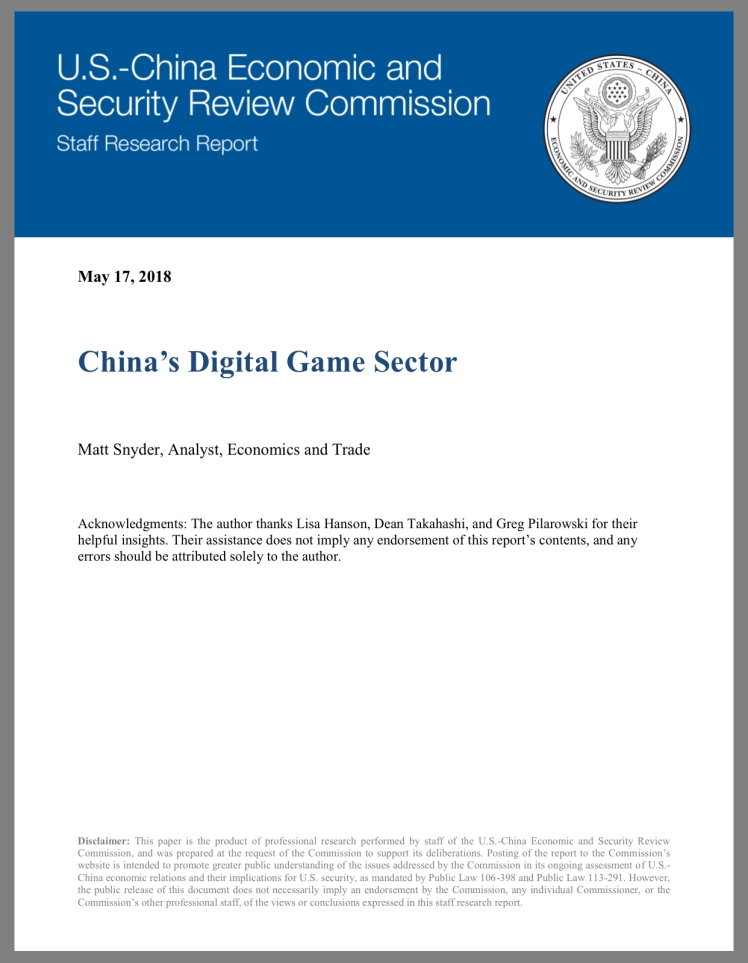
Executive Summary
Access to China’s digital game market is heavily restricted to U.S. and foreign game companies. Legally, the only way for U.S. personal computer (PC) and mobile game companies to enter the Chinese market is by licensing their games to Chinese operators who use their protected position to obtain a larger revenue share from U.S. games—in some cases, the majority of what a U.S. game earns in China.
Within this protected market, China’s digital game firms have emerged as some of the largest in the world and have begun acquiring foreign game companies. China’s Tencent is the world’s largest gaming firm and owns the world’s top mobile and PC games by revenue. Since 2015, Chinese companies accounted for 70 percent of all digital game company acquisitions. These acquisitions are likely facilitated by the high revenue shares Chinese firms earn from foreign games and their protection from foreign competition. Chinese acquisitions of foreign game companies raise privacy concerns given the power of the Chinese government to obtain information from Chinese firms and the broad array of data collected from gaming devices (including mobile phones) such as geolocation, camera, contact, and audio recording data. Chinese game companies such as Tencent conduct a broad array of business operations (including social media, online shopping, online video content, and artificial intelligence research) incentivizing them to collect more information than U.S. game firms.
Click to access chinas-digital-game-sector.pdf
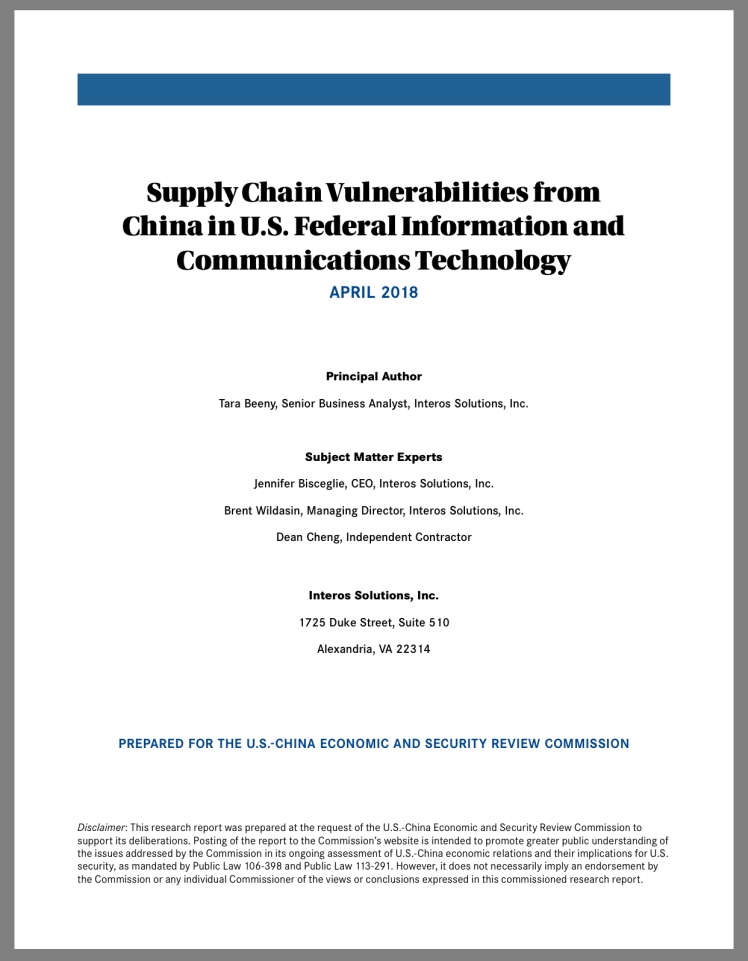
The U.S. government needs a national strategy for supply chain risk management (SCRM) of commercial supply chain vulnerabilities in U.S. federal information and communications technology (ICT), including procurement linked to the People’s Republic of China (China or PRC). This strategy must include supporting policies so that U.S. security posture is forward-leaning, rather than reactive and based on responding to vulnerabilities, breaches, and other incidents after they have already damaged U.S. national security, economic competitiveness, or the privacy of U.S. citizens.
Click to access interos_supply-chain-vulnerabilities-from-china-in-u-s-federal-ict_final.pdf
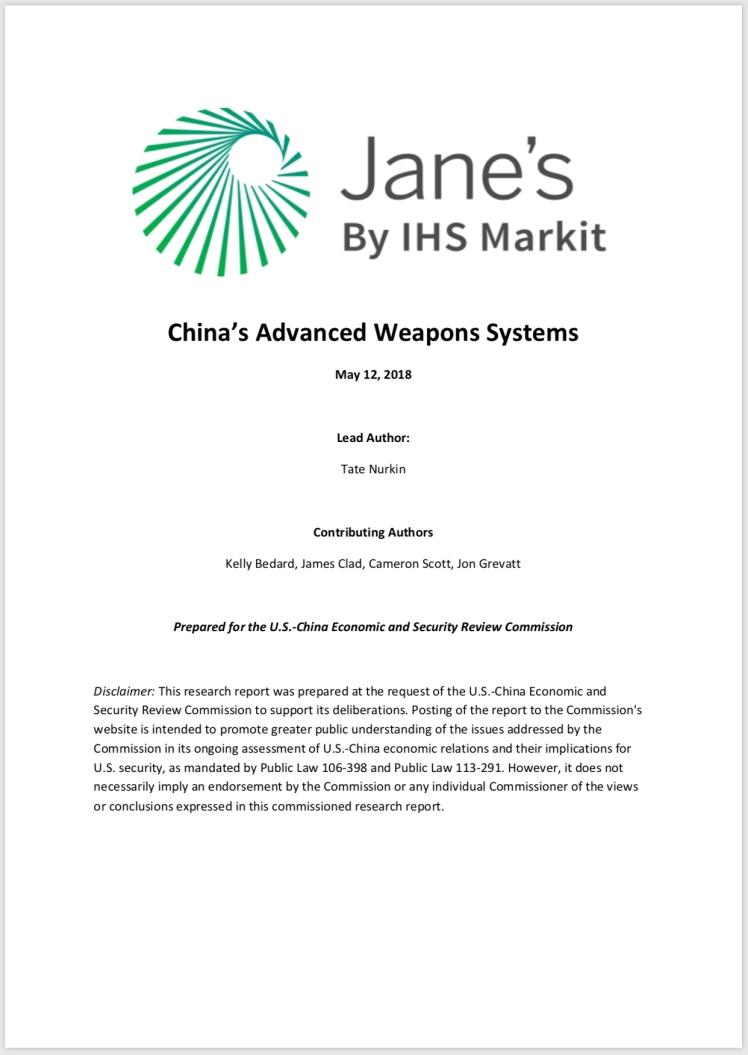
Disclaimer: This research report was prepared at the request of the U.S.-China Economic and Security Review Commission to support its deliberations. Posting of the report to the Commission’s website is intended to promote greater public understanding of the issues addressed by the Commission in its ongoing assessment of U.S.-China economic relations and their implications for U.S. security, as mandated by Public Law 106-398 and Public Law 113-291. However, it does not necessarily imply an endorsement by the Commission or any individual Commissioner of the views or conclusions expressed in this commissioned research report.
Click to access janes-by-ihs-markit_chinas-advanced-weapons-systems.pdf
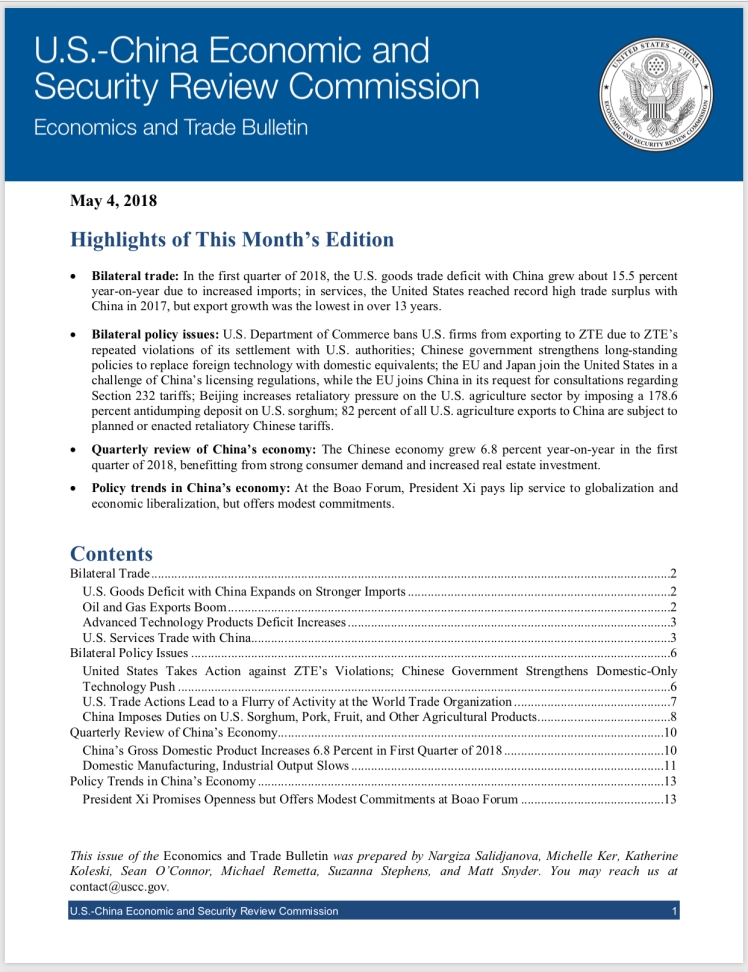
Highlights of This Month’s Edition
• Bilateral trade: In the first quarter of 2018, the U.S. goods trade deficit with China grew about 15.5 percent year-on-year due to increased imports; in services, the United States reached record high trade surplus with China in 2017, but export growth was the lowest in over 13 years.
Click to access 2018-may-trade-bulletin.pdf
#BSG